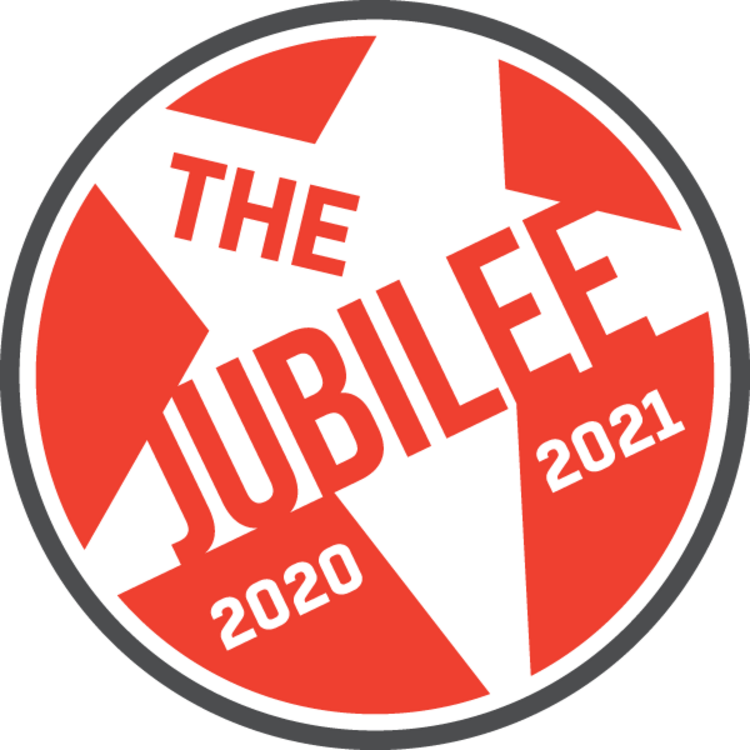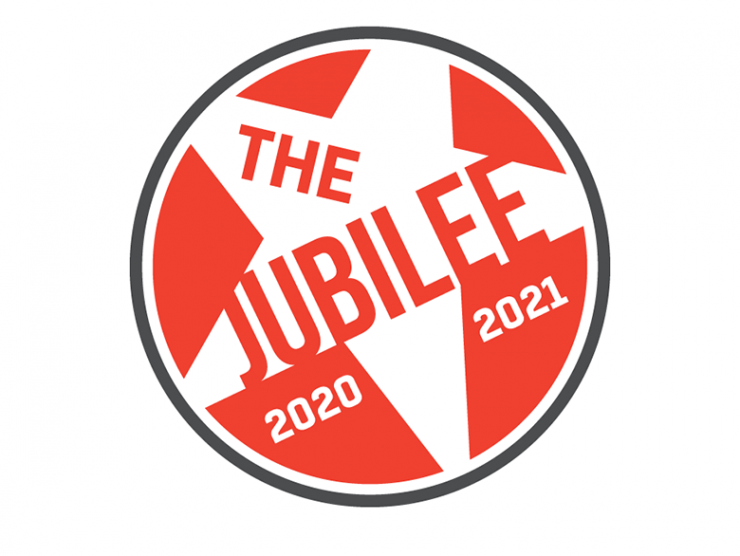Party Planning
The Jubilee Answers Questions, Gives Advice, and Asks for Help
The initial impulse of the Jubilee was a response to damning statistics that the American Theatre as a whole chooses to produce more men than women, more plays written by white people than is proportionate to our population, and to too often relegate plays by people of color to certain months of the year in smaller venues.
It’s our ambition that the theatre will be a place of leadership and experimentation in its growth toward equality and social justice. We want our field to be a paragon of inclusivity and innovation that businesses and the larger world of entertainment can look to as an exemplar.
And we need your help and your ideas, now more than ever. The Jubilee is gaining great strength already organized solely by a band of ragtag outsiders. What we have done so far is amazing! But the very premise requires participation. The Jubilee is not at all achievable in isolation.
And the Jubilee is one of the many responses and acts of resistance that will be required by the coming attempts to frighten and intimidate artists, women, queers, people of color, the differently-abled, deaf, and Native peoples.
“I’m not surprised,” a queer friend of color said in response to the election of Trump, “this is the world I’ve lived in my whole life.” The Jubilee is one possible response. We are trying to create a different world. A year-long national festival that will showcase the depth of talent in the American theatre.
The organization of the Committee for the Jubilee was as simple as an initiatory email, that lead to a group phone call, that led to more emails, that led to more phone calls. (If you feel like you have something to say to the Committee of the Jubilee or an interesting refinement or caveat, there are avenues listed below whereby you can join. (You could even end up being in charge!)
Just over one year ago on Saturday, October 17, 2015 the Committee of the Jubilee, a self-organized group of theatremakers from around the country published a call to action for the American Theatre community. The premise is simple. Theatres and individuals who want to commit to the vision of a year of Jubilee in the 2020-2021 season are invited to sign a pledge and be listed publicly.
And the Jubilee is one of the many responses and acts of resistance that will be required by the coming attempts to frighten and intimidate artists, women, queers, people of color, the differently-abled, deaf, and Native peoples.
The Pledge
What if there was a nation-wide, year-long theatre festival in the United States of America featuring only superlative work by women, people of color, Native American artists, LBGTQIA artists, Deaf artists, and artists with disabilities?
In order to address equity in the American Theatre and in my community, I pledge to support a manifestation of this diverse, inclusive, and intersectional vision in the 2020-2021 season to the fullest degree.
This will be a season of Jubilee! I look forward to celebrating the work of traditionally marginalized voices throughout all of 2020-2021 and making permanent progress toward inclusion even after 2021. I ask you to join me. Together, we can change the face of the American Theatre.
To date, we have sixty-five theatres and fifteen individuals signed on, and a decentralized Committee of fifty-five working on behalf of the Jubilee. By the end of this year, we are working to get pledges from two-hundred theatres and five-hundred individuals. Join us?!
Here are responses to some of our most frequently asked questions. If you have one that isn’t answered, please comment!
What is the point of doing this for just “one year”?
The Jubilee is a tool. The tool is intended to move the American theatre toward equity. By inviting every theatre in the US to participate we are hope to foster new relationships. We want audiences to know and adore more of the best playwrights who have been ignored. We want to disrupt patterns of inequity that have become habitual.
You know not every theatre is going to do this, right?
No. Maybe. Who cares? If one theatre does it, it’s great. We’re at sixty-something today. The goal is to move the American theatre. It probably wouldn’t be as fun if we could actually mandate it from a congressional level. It’s voluntary. It’s a party. If it doesn’t sound fun to you, don’t go. But getting one, or ten, or one hundred more productions from underrepresented parties would be a great success. Raising consciousness would be a success. And we’ve already started having fun, which is a great success!
What happens when the Jubilee is over?
We do hope that new friendships are created, between playwrights and theatres. Between audiences and playwrights. Between theatres and new audiences. We hope we can never go back to a system that is so biased against our friends and wives and daughters and sisters. We hope the theatre looks more like our actual communities. And we hope that we can look to improve other areas of the world where people feel shut out.
What if a theatre signs up for the Jubilee but fails to live up to its pledge?
The Jubilee has no enforcement committee and is not looking to become a police force. It’s a party, not a law. We hope all theatres will pledge. We hope that all theatres will fulfill their pledges. We hope if a theatre has trouble fulfilling its pledge that it will reach out to us, to other theatres, to you. But we do not plan on punishing or publicizing a list of successes or failures. The change in the American theatre is the success.
Why is the Jubilee so far in the future?
It’s not. Or at least, not for long. We’re just so far in the past. We want to give theatres time to think about the pledge and to make substantive changes to support the work of the Jubilee. To reach new audiences, to commission new artists. To fulfill any and all existing contracts and plans with theatres.
What about theatres that already do this work?
They have been inspirations and leaders in this movement. They are our elders. We are relying on them to speak to us about how to and to help us clarify our goals and our language.
What if there aren’t enough good plays?
This is one of the great myths we hope to counter. Most theatres do not aim to produce only men or two thirds straight white men. Most theatres aim to produce the best plays available to them. But in some ways the limitations of the theatre’s past become their own patterns for the future, if two-thirds of all productions are men, then the list of “successful” plays will be skew male. By pointing artistic directors’ eyes toward writers they haven’t seen, we hope to expand the list of writers who make good plays. The Kilroys have shown that there is a huge list of plays smart people consider great that are not being produced enough.
What about Straight White Men?
Love them. The person typing this particular answer to this FAQ is one! There is not intent or desire to do harm to any straight white man. We think the Jubilee will end up being a benefit to all of us. Straight White Men deserve to see the widest array of work, to be inspired by artists that reflect their community and to earn their success in a balanced field, not in a game that favors them.
What about Shakespeare?
Love him! Great plays. We hope Shakespeare festivals discuss and decide how they can participate. Creative solutions are more exciting than trying to say it doesn’t work.
What about directors, designers, technicians, actors, etc.?
They all deserve their own Jubilee.
What can I do as an actor?
You can agree not to accept roles written for actors of color or actors with disabilities. You can refuse to appear in plays written by straight, non-disabled white men.
When will it all be over?
There is no end to our need to grow and educate ourselves. Gay rights and transgender rights were emergent in popular culture in our lifetime. We hope there will be more emergent groups and classes of people that focus our attention in new areas.
Want to Join the Jubilee?
Sign the pledge on behalf of your organization by clicking here. Sign the pledge as an individual by clicking here. If you'd like to help with Jubilee organizing efforts, click here to join the Committee of the Jubilee.
***
Editor's note: The language of the pledge was updated on September 29, 2017. The previous language read: "In order to address equity in the American Theatre and in my community, I pledge to support a diverse, inclusive, and intersectional vision in the 2020-2021 season: Every theatre in the United States of America will produce only work by women, people of color, Native American artists, LBGTQIA artists, deaf artists, and artists with disabilities. This will be the season of Jubilee! I look forward to celebrating the work of these traditionally marginalized voices and making permanent progress toward inclusion even after 2021. I ask you to join me. Together, we can change the face of the American Theatre."



Comments
The article is just the start of the conversation—we want to know what you think about this subject, too! HowlRound is a space for knowledge-sharing, and we welcome spirited, thoughtful, and on-topic dialogue. Find our full comments policy here
The Committee of the Jubilee is so appreciative to HowlRound for providing us space in the outset for our FAQ, among a few other pages. You can now visit our website https://jointhejubilee.org. We've also expanded our FAQ https://jointhejubilee.org/... Including questions such as "I read an article about the Jubilee in the National Review. What’s your response?"